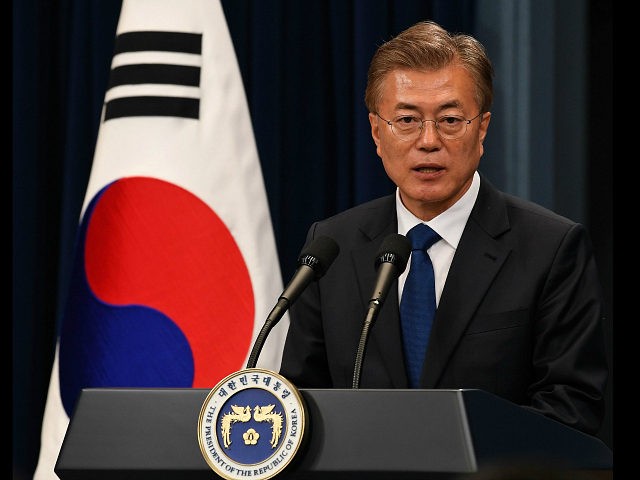Moon Jae-in, the new president of South Korea, campaigned on renewing dialogue with North Korea and adopting a less confrontational stance than his impeached predecessor, Park Geun-hye.
He also clearly gave the impression he would be less confrontational than the United States has been of late. However, on Wednesday President Moon said, “there is a high possibility of a military conflict” with North Korea.
“North Korea launched a missile four days ago and claims to have succeeded in launching an intermediate-range ballistic missile,” said Moon, speaking at the South Korean Defense Ministry. “Launching ballistic missiles is a serious provocation that violates UN Security Council resolutions, as well as being a serious challenge to global peace and stability. We will never tolerate such North Korean provocations and nuclear threats.”
He promised to “sternly deal with the North, together with the international community.”
Moon made his comments hours after his government restated its desire to resume dialogue with North Korea and three days after North Korea’s latest provocative missile test. Reuters notes that the test was detected by the up-and-running components of the THAAD missile shield, which North Korea and its patron China strongly oppose, in part because its sensory systems are so powerful.
There seems to be a convergence of opinion between the Moon administration and the United States since Moon has qualified his call for moderation toward North Korea by asking for some concessions from Pyongyang to get talks restarted. The U.S. has said North Korea must abandon its nuclear weapons program entirely; Moon said, “North Korea must change its attitude of insisting on pressing ahead with its arms development before dialogue is possible,” as Reuters puts it.
U.S. Ambassador to the United Nations Nikki Haley put the American position in forceful terms on Tuesday: “We have to turn around and tell the entire international community: You either support North Korea or you support us.”
“The United States is not past looking at third-country entities who are helping North Korea and putting sanctions against them. If you’re supporting North Korea, you’re against the rest of the international community,” said Haley, as the U.N. debated its response to the latest North Korean missile launch.
Haley said the U.S. was still working on persuading China and Russia to support stronger sanctions against North Korea, to which end she “pointedly reminded Russia that the North’s latest missile test had reached close to Russia’s border,” as the New York Times puts it.
Russia nevertheless seems determined to protect North Korea, as Russian President Vladimir Putin insisted that “intimidating” Pyongyang was “unacceptable.”
For their part, the North Koreans showed little sign of giving President Moon the change in attitude he is looking for. The North ignored international condemnation of its missile test, which demonstrated some disturbing advances in long-range missile technology, and insisted it would “conduct ICBM tests anytime and anywhere, in accordance with the decisions made by our central leadership.”
Another development that may complicate Moon’s plans for renewed dialogue with North Korea is the massive cybercrime attack against computer systems across the world this weekend. Evidence has been found implicating hackers linked to North Korea in the attack.
On Tuesday, the New York Times quoted cyber security experts who described these hackers as a type of “sleeper cell” planted in various Asian nations in what amounts to “war contingency planning in case the homeland is attacked.” Some of these sleeper-cell hackers have secured information technology jobs abroad, after receiving advanced computer training at Russian, Chinese, and Indian schools.
NYT sources speculated the WannaCry ransomware attack might have been timed to coincide with last weekend’s missile launch as a demonstration of North Korean power, or possibly even as pushback against China, which has been applying an extraordinary amount of pressure against its client state in Pyongyang of late.
South Korea’s Yonhap News notes that Moon has promised to increase South Korea’s defense budget from the current 2.4 percent of GDP to 3 percent. In his remarks about North Korea on Wednesday, Moon stressed the importance of having “defense that is not only in words but in real capability.”

COMMENTS
Please let us know if you're having issues with commenting.